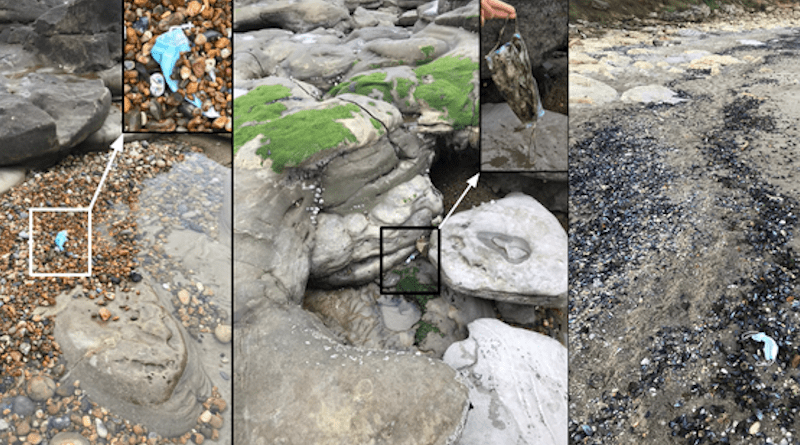Discarded Disposable Face Masks Pose A Threat To Marine Life
Disposable face masks could be harmful to wildlife, according to researchers who have observed harmful effects of the masks on keystone marine animals in coastal areas.
The researchers observed altered behaviors in tide pool animals that appear to be associated with the chemicals leaching from disposable masks. The behavioral effects include signs of stress and reduced ability to detect mates and reproduce.
The effects could have repercussions in the marine food chain, potentially cascading up to affect the seafoods humans consume, according to the researchers who will report results from their ongoing experiments on 3 March at the 2022 Ocean Sciences Meeting, being held online from 24 February through 4 March.
“We’re seeing more and more masks in rocky pools,” said Laurent Seuront, a marine ecologist at the French Centre National de la Recherche Scientifique, who will present the new research. “This could cascade up the food chain and up to us.”
The rapid proliferation of face mask litter in rocky tidal areas prompted Seuront and an international team, including K. Nicastro from CCMAR (Portugal) and G. Zardi from Rhodes University (South Africa), to study how disposable masks might be affecting keystone species at the bottom of the marine food web.
Disposable face masks are commonly made of plastic fibers, which are composed of the same plastic polymer (polypropylene) previously shown to have negative effects on aquatic organisms.
The researchers designed experiments to see how long face masks leach chemicals into water, as well as whether marine invertebrates change their behaviors when masks are present. The invertebrates in the study include small crustaceans called copepods, the blue mussel Mytilus edulis and the marine snail Littorina littorea.
Using tanks with simulated rocky surfaces and patches of face mask material, the researchers were able to observe animals’ behaviors.
Blue mussels moved away from the face mask materials, gathering together, or aggregating, in a way they typically do to avoid threats. The amount of aggregation is a measure of how stressed the mussels are, Seuront explained. In the experiments, mussels avoided the mask materials and aggregated at a rate of 70%, compared to just 30% when masks were not present.
Mussels move on a single foot and have a sensory organ (the osphradium) that allows them to essentially taste the quality of the water surrounding them, Seuront explained.
Their experiments have shown that unlike mussels, marine snails did not avoid masks and mask fragments, but consistently showed signs of behavioral stress when crawling on them and preferred uncontaminated over contaminated surfaces. The snails also showed signs of being impaired by the chemicals. They were less vigilant after being exposed to leached chemicals, which increase their likelihood to be predated, Seuront reported.
Copepods, for their part, appeared to have reproductive challenges due to exposure to the mask chemicals. Male copepods were observed to be significantly less able to detect female pheromone trails, which made it much harder and less likely they would locate females and reproduce.
The broader problem, Seuront explained, is that these and other small invertebrates feed larger animals in marine food webs. If these invertebrates are having problems because of disposable masks, the effects can spread through the food web.
“This could cascade up the food chain and up to us,” Seuront said.

